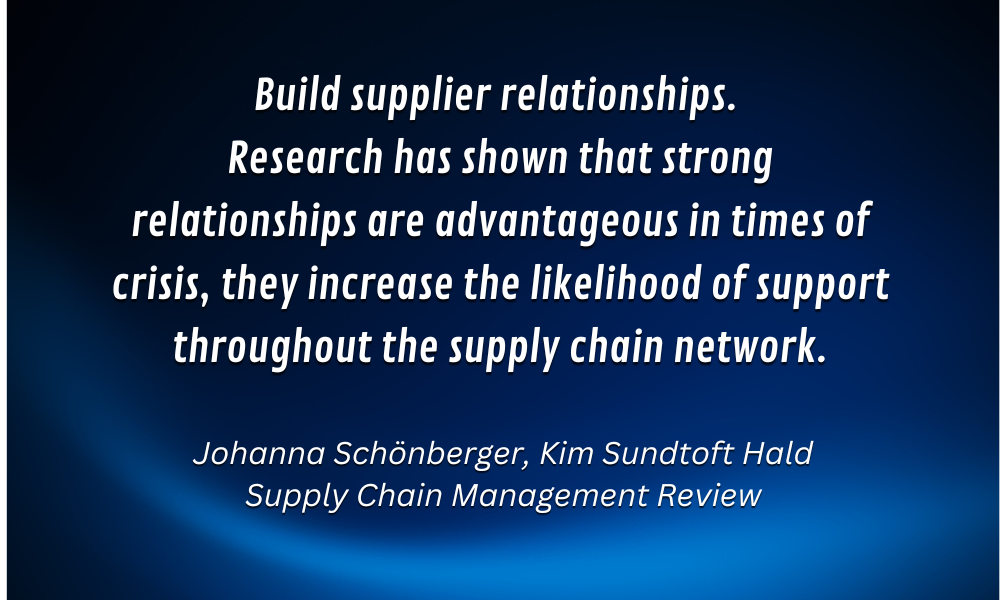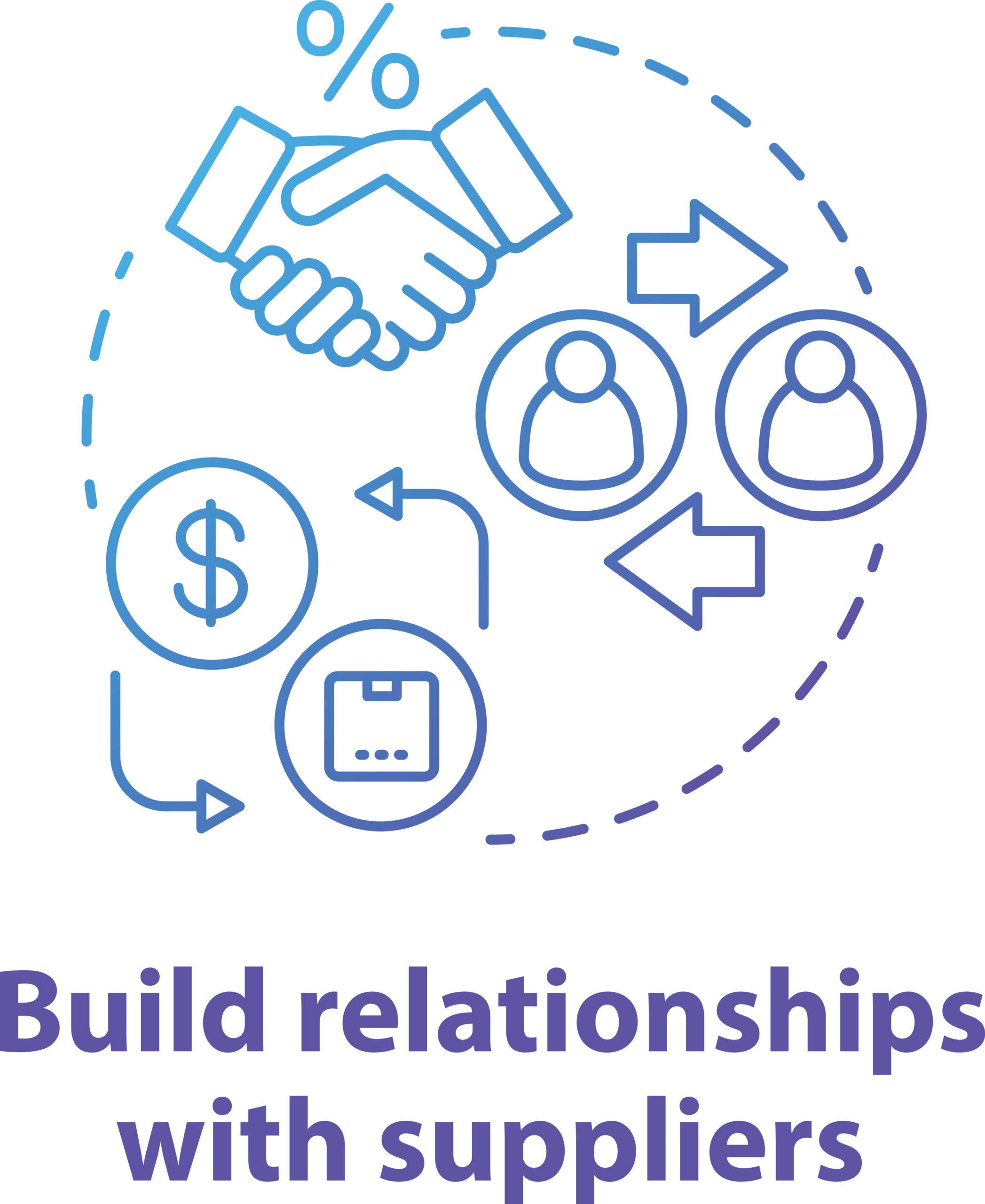
As many of us have learned from the pandemic, the supply chain is susceptible to major disruptions. We also discovered that expanding supplier networks are crucial for maintaining a robust and flexible supply chain. An Enterprise Resource Planning (ERP) system can significantly streamline this process, making it easier to manage and expand your network of suppliers. In this article, we’ll explore leveraging ERP supply chain features to extend your supplier network in preparation for more supply chain issues.
Supply Chain Issues Continue
The pandemic showed how globalized our world is and how complex our supply chains are. It also revealed their weakness. When any link in this chain breaks, disruptions are inevitable. Unfortunately, our current chain continues to recover from pandemic-related disruptions, making it hard for some to fulfill customer orders.
Despite worldwide labor disputes, extreme weather events, and trade route issues from foreign conflicts, there is some good news. According to an article from Florida Atlantic University, in September 2024 the supply chain index rose to its highest reading in the past two years. However, nothing is ever set in stone.
The Trump Administration is proposing to place import tariffs on goods from several countries. For manufacturers, this could mean higher prices on raw materials and components and higher prices for customers. According to Industry Today, the potential impact of the new administration’s proposed import tariffs on manufacturing depends on several factors. “They include the extent of the tariffs, industries involved, and the ability of manufacturers to adapt.”
While they could create problems for current manufacturers, the tariffs are intended to stimulate U.S. production. Companies may choose to respond to higher tariffs by investing in automation and process improvements to reduce rising costs. Tariffs could even spur innovation as companies explore ways to reduce their reliance on imported materials.
One thing remains clear, however. Manufacturers are preparing for the worst and scrambling to find new vendors for their supplier network.
Benefits of Diversifying Your Supplier Network
By expanding supplier networks, companies can open themselves up to new opportunities for procurement efficiency, better inventory management, and improved processes. Here are a few benefits:
1. Risk Mitigation & Improved Resilience
 Diversify: By having more suppliers, manufacturers can lower the risk of supply chain problems. This helps avoid relying on just one or a few suppliers. If one supplier faces issues such as production delays, financial instability, or natural disasters, alternative suppliers can help ensure continuity.
Diversify: By having more suppliers, manufacturers can lower the risk of supply chain problems. This helps avoid relying on just one or a few suppliers. If one supplier faces issues such as production delays, financial instability, or natural disasters, alternative suppliers can help ensure continuity.
2. Cost Savings
Competitive Pricing: A larger supplier network provides more opportunities to negotiate better prices and terms. Competition among suppliers can reduce costs, leading to more favorable procurement deals.
3. Quality Improvement
Access to Superior Products: With a wider selection of suppliers, manufacturers can identify those that offer higher-quality materials or components. This can lead to improved product quality and customer satisfaction.
4. Innovation and Technology
Access to New Technologies: Expanding the supplier network can expose manufacturers to suppliers with innovative technologies or processes. This could result in enhanced product offerings or improved manufacturing efficiency.
5. Capacity and Scalability
Increased Production Capacity: Relying on multiple suppliers can help manufacturers scale production more effectively to meet increasing demand or seasonal peaks. It ensures that there is sufficient capacity to handle large orders without overburdening a single supplier.
6. Flexibility and Agility
Quick Adaptation to Market Changes: A diverse supplier base allows manufacturers to quickly adapt to changing market conditions. These may include shifts in consumer demand or new regulatory requirements. It provides the flexibility to source alternative materials or components as needed.
7. Strategic Partnerships
Building Long-Term Relationships: Expanding the supplier network can lead to strategic partnerships that offer long-term benefits. Some include collaborative product development, joint ventures, or exclusive supply agreements.
8. Geographic Reach
Global Sourcing Opportunities: By expanding their supplier network, manufacturers can access new U.S. or global markets with lower tariffs. In turn, they can source materials or components from regions that offer cost advantages or unique resources.
9. Improved Supplier Performance
Performance Benchmarking: With more suppliers available, manufacturers can compare important metrics like delivery times, quality, and pricing. This data-driven approach helps in selecting and efficiently managing high-performing suppliers.
10. Regulatory Compliance
Meeting Compliance Standards: Different suppliers may not always comply with industry standards and regulations. Expanding your U.S. supplier network can help manufacturers find suppliers that adhere to regulations, reducing the risk of non-compliance.
Strengthen Your Supplier Network with ERP SCM
Leveraging ERP supply chain management (SCM) to strengthen your supplier network offers numerous benefits. By utilizing the following ERP tools, you can build a quality supplier network that supports your business success.
1. Vendor Database Management
Centralized Repository: ERP software provides a centralized database where you can store comprehensive information about potential suppliers. This includes contact details, product offerings, pricing, quality certifications, and performance metrics. Having all this information in one place makes it easy to compare and evaluate new vendors. This helps you ensure you choose the best partners for your supplier network.
Automated Supplier Screening: With ERP supply chain features, you can set up automated filters. That way you can identify suppliers that meet your specific quality, sustainability, and compliance requirements. This automation simplifies the initial vendor vetting process, ensuring that only qualified suppliers are considered.
2. Streamlined Procurement Process
Online RFQ/RFPs: Using ERP supply chain features, you can send out requests for quotes (RFQs) and requests for proposals (RFPs) to a wider pool of potential suppliers quickly and efficiently. This not only speeds up the procurement process but also allows you to reach more suppliers, increasing your chances of finding the best deal.
Automated Purchase Orders: Once a new supplier is approved, the ERP system can automatically generate purchase orders. This reduces manual data entry, minimizes errors, and expedites the procurement process, ensuring a smooth transition from supplier selection to order placement.
3. Supplier Performance Analysis
Real-Time Data Visibility: ERP supply chain management allows you to monitor key supplier performance metrics like deliveries, quality, and pricing. Real-time visibility helps you identify top-performing suppliers and those that need to improve. Having this data helps you make more informed decisions about your supply chain operations.
Data-Driven Decision Making: By analyzing performance data, you can identify opportunities to expand and strengthen your supplier network. For instance, you might find new vendors with similar quality and cost structures. This allows you to diversify your supplier base while maintaining high standards.
4. Market Intelligence and Sourcing Optimization
Market Trend Analysis: ERP systems can help you with industry analytics as well. You can thoroughly review industry trends and identify new potential suppliers in emerging markets or with innovative product offerings. Staying ahead of market trends ensures that your supply chain remains competitive and agile.
Cost Comparison Tools: ERP supply chain processes often include cost comparison tools for supplier network pricing comparisons. This helps you identify cost-effective sourcing options and negotiate better deals, contributing to overall cost savings.
5. Collaboration and Communication

Strengthen and expand your supplier network with ERP Supply Chain Management tools from Frontier.
Supplier Portal Access: Providing suppliers with access to a secure portal within your ERP system enhances supplier network relationships. The ERP supply chain functions allow them to view purchase orders, update inventory levels, and communicate important information directly. This transparency ensures everyone is on the same page.
Improved Communication Channels: Streamlining communication with suppliers through the ERP supply chain features ensures timely updates on order status, delivery schedules, and quality concerns. Improved communication leads to fewer misunderstandings and more efficient operations.
Advantages of ERP Supply Chain Management
Increased Efficiency
Automating repetitive tasks related to supplier onboarding and procurement frees up time for strategic sourcing activities. This increased efficiency allows your team to focus on higher-value tasks.
Improved Cost Savings
By identifying and leveraging new suppliers with competitive pricing through data-driven analysis, you can achieve significant cost savings. The ability to quickly compare and negotiate with suppliers ensures you get the best value.
Enhanced Supplier Relationships
A centralized platform for communication and collaboration fosters better relationships with suppliers. This improved interaction can lead to more favorable terms and a more reliable supply chain.
Greater Supply Chain Agility
Accessing a broader supplier network enables you to quickly adapt to market changes and respond to demand fluctuations. This agility ensures that your supply chain remains resilient and capable of meeting your business needs.
Frontier ERP Supply Chain Management
Frontier offers a robust ERP supply chain management module designed to help you strengthen your supplier network effectively. Here are a few ways Frontier ERP can help:
- Complete Visibility: Frontier ERP offers real-time visibility into your entire supply chain. Easily track shipments, manage inventory, monitor performance metrics, and more.
- In-Depth Analytics: With Frontier’s reports and analytics, you can create accurate demand forecasts and delivery reports. This helps you make better decisions across your supplier network.
- Supplier Collaboration: Frontier ERP supply chain features improve communication with suppliers, helping you negotiate better terms and streamline procurement processes.
- Automation and Efficiency: Frontier’s automation capabilities reduce manual processes, minimize errors, and boost operational efficiency, leading to better supply chain management.
- Advanced Planning: Frontier’s Distribution Requirements Planning (DRP) works in conjunction with the Material Requirements Planning (MRP) module. That way you can plan logistics, warehouse operations, and procurement, ensuring products are delivered efficiently.
Implementing these ERP supply chain strategies with Frontier can significantly strengthen your supplier network and save you money.
Would you like more information on Frontier ERP’s supply chain features to improve your supplier network?
More Resources From Our Library…
Logistics Solutions for New Suppliers






